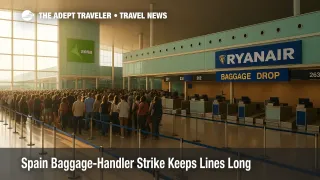Spain baggage-handler strike keeps lines long

Azul Handling's open-ended strike is now in daily effect, with pressure concentrated during peak banks that align with early morning, midday, and late-evening departures. At Barcelona-El Prat Airport (BCN), Palma de Mallorca Airport (PMI), Valencia Airport (VLC), and César Manrique-Lanzarote Airport (ACE), travelers report slower check-in, bag drop, and carousel delivery as legally mandated minimum-service levels govern operations. Spain's transport ministry has set airport-specific protection percentages through November, and AENA is directing passengers to their airlines for the latest flight and baggage handling updates.
Key points
- Why it matters: Persistent slowdowns are likely at Spain's busiest leisure gateways.
- Travel impact: Expect longer lines 5-9 a.m., noon-3 p.m., 9-11:59 p.m. local.
- What's next: Minimum-service protections remain in force through November.
- Pack light; verify through-checked bag delivery at your origin.
- Build extra time for Ryanair group flights at affected counters.
Snapshot
Ground staff at Azul Handling, which services Ryanair group carriers, escalated from scheduled walkouts to an indefinite strike beginning October 1. While the action is 24 hours daily, local committees continue to apply pressure in three familiar windows, which often coincide with peak departure banks. Spain's State Secretariat for Transport has imposed minimum-service levels by airport and route category, allowing most flights to operate but with reduced staffing at key points like check-in, bag drop, and ramp turnarounds. AENA, Spain's airport operator, advises passengers to check directly with their airline, arrive earlier than usual during peak windows, and consider traveling with carry-on only when possible. Knock-on delays may persist beyond the strike windows as operations normalize.
Background
Azul Handling's dispute has spanned the high-season and shoulder-season periods, initially targeting select days and later moving to an open-ended strike. The government's minimum-service framework differentiates essential operations, including public-service obligation routes and island connectivity, from domestic and international routes with alternative ground transport. Protection percentages vary by airport and month, balancing the right to strike with mobility needs. For travelers, the practical effect is not mass cancellation but friction at counters and carousels, particularly where a high share of flights are handled by Azul for Ryanair group brands. Lines tend to lengthen in the morning outbound bank, again midday, and in late evening when many leisure flights depart.
Latest developments
Peak windows and protection levels at Barcelona, Palma, Valencia, and Lanzarote
Spain's transport ministry resolution sets airport-specific minimum-service protection for October and November. Barcelona sees 59 percent protection in October and 57 percent in November. Palma de Mallorca is set at 54 percent in October and 51 percent in November. Valencia is set at 57 percent in October and 47 percent in November. Lanzarote is set at 55 percent in October and 49 percent in November. In practice, that means most flights operate, but counters, gates, and baggage delivery move slower when staffing is stretched. AENA confirms the strike is indefinite and directs customers to airlines for flight-specific handling status. If you are connecting onward in Spain or across the EU, verify that your checked bag is loaded and tagged correctly at the origin station, and consider carrying on during peak windows. For broader context on timing and affected airports, see our primer, Spain baggage-handler strikes: timetable and airports, and our update, Spain baggage-handler strike keeps rippling delays.
Analysis
For travelers, the Azul Handling strike is a throughput problem rather than a blanket shutdown. Minimum-service rules keep a significant share of flights operating, especially on high-priority routes, yet bottlenecks emerge wherever ground roles concentrate. The three familiar windows, morning, midday, and late evening, map to Spanish peak banks for short-haul European leisure flying, so that is where lines will grow first. Travelers checking bags on Ryanair group flights should factor in slower document checks, bag acceptance, and occasional carousel delays on arrival. Because AENA is channeling all flight-specific handling questions to airlines, the most reliable tactic is to monitor your airline app and confirm baggage acceptance at the origin counter before you part with your bag. If you are making a self-transfer, pad the connection by at least one extra bank cycle in case your bag lags. Carry-on travel remains the most resilient strategy, particularly at Barcelona, Palma de Mallorca, Valencia, and Lanzarote while protection levels are in the 47 to 59 percent range.
Final thoughts
Plan around the 5-9 a.m., noon-3 p.m., and 9-11:59 p.m. windows, arrive earlier, and travel with carry-on if possible. At Barcelona, Palma de Mallorca, Valencia, and Lanzarote, minimum-service protections mean flights will largely operate but at reduced ground throughput, so the smartest move is to verify baggage acceptance and delivery, build margin for counters and carousels, and avoid tight connections. With an open-ended labor action and variable protections by airport, the situation will keep lines long until there is a settlement, making proactive planning the best defense during the Spain baggage-handler strike.
